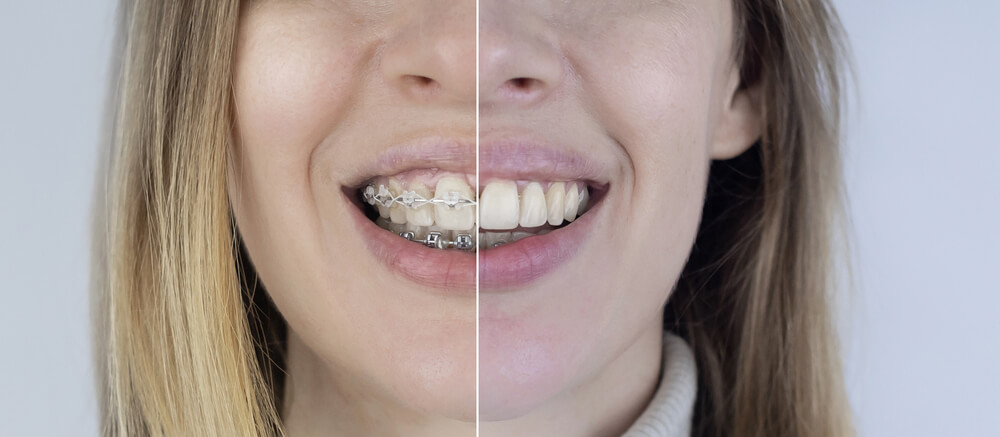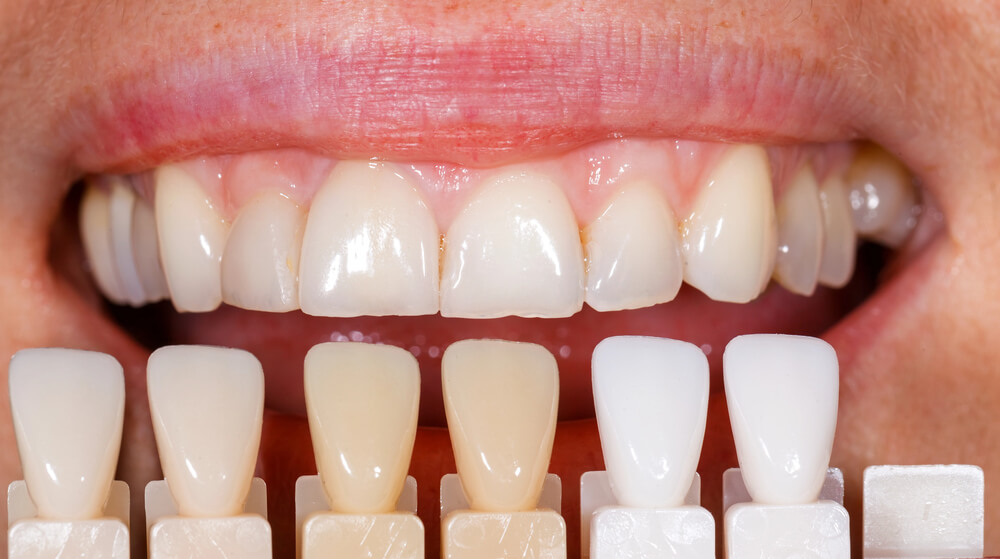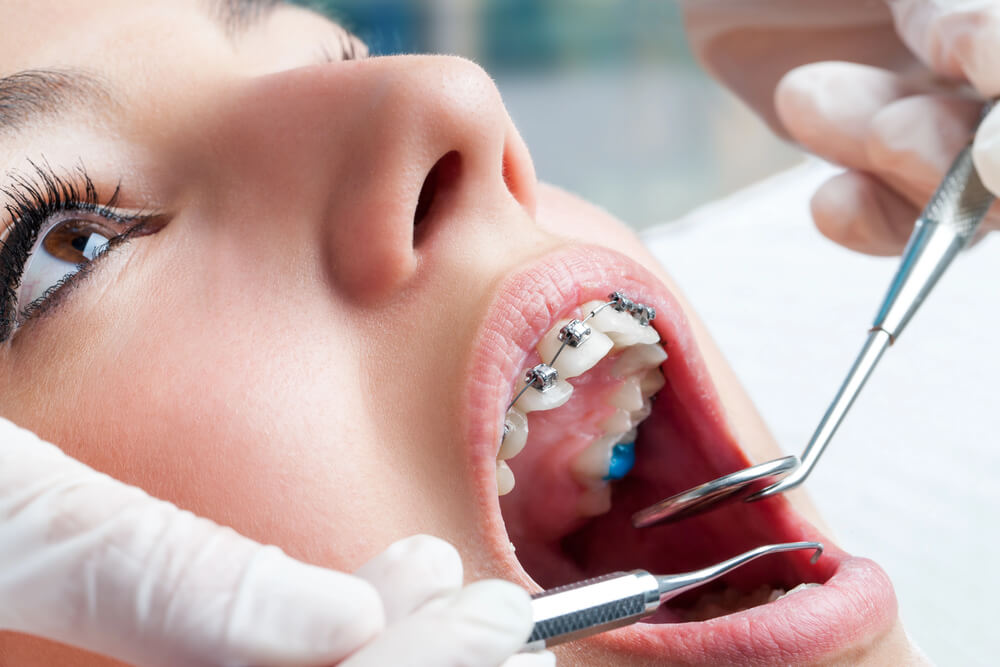Both veneers and braces offer unique benefits and potential drawbacks. To determine which of these orthodontic treatments is best for you, you and your orthodontist will need to take a variety of factors into consideration. Here’s your guide on how to choose between veneers vs. braces.
Veneers vs. Braces: What’s The Difference?

Veneers are thin shells of porcelain or composite resin that are custom-made to fit over the front surface of your teeth. They can correct various cosmetic issues such as discoloration, chipped teeth, gaps, and minor misalignment. Veneers provide a quick transformation, often within just a few visits.
Braces, on the other hand, are orthodontic devices used to correct significant alignment issues and bite problems. Traditional braces consist of metal brackets and wires, but there are also ceramic and clear aligner options available. Treatment with braces usually takes longer than veneers, often ranging from 18 months to several years.
Is It Better to Get Veneers or Braces?
Deciding between veneers and braces depends on your specific dental needs and goals. The best option for you will depend on your individual circumstances.
Pros and Cons of Veneers
The advantages of veneers include quick results, aesthetic appeal, and versatility. Veneers can dramatically improve your smile in a matter of weeks. They also look natural and can be customized to match your existing teeth. Furthermore, they can address multiple cosmetic issues at once.
The disadvantages of veneers include their irreversibility, cost, and maintenance. When you get veneers, a small amount of enamel is removed from your teeth. This is irreversible. Veneers can also be expensive, especially if you need more than one. Additionally, veneers can chip or crack, requiring repair or replacement.
Pros and Cons of Braces
The advantages of braces include their ability to correct more serious issues, long-lasting results, and versatility. Braces can correct severe alignment and bite issues. Furthermore, they are suitable for patients of all ages.
The disadvantages of braces include longer treatment time, maintenance, and aesthetic concerns. It may take years for patients with more serious conditions to achieve the desired results with braces. Braces also require regular adjustments and diligent maintenance. Additionally, traditional braces are more noticeable.
Who Might Prefer Veneers And Who Might Prefer Braces?

Veneers might be the best option for individuals who have generally healthy teeth and gums and want to improve their smile quickly. They can also be a good option for patients who need to correct minor cosmetic issues like discoloration, small gaps, or chipped teeth.
Braces are often the better choice for individuals with significant alignment or bite issues. They are also a good option for patients who are willing to commit to a longer treatment period for lasting results, as well as for patients who want to avoid the irreversible nature of veneers.
Can You Skip Braces and Get Veneers?
In some cases, you might be able to skip braces and opt for veneers instead. If your teeth are slightly misaligned or have minor cosmetic flaws, veneers can provide an effective solution. However, if you have significant alignment problems or bite issues, braces are likely necessary to achieve the desired results. An orthodontist can evaluate your specific situation and recommend the best treatment plan for your needs.
The Process of Getting Veneers
Getting veneers is a relatively quick and straightforward process compared to braces. Here’s a step-by-step overview of what you can expect if you decide to go the veneer route:
- Consultation and Planning: Your orthodontist will assess your dental health and discuss your aesthetic goals.
- Preparation: To prepare your teeth for veneers, your orthodontist will remove a small amount of enamel from the front surface of your teeth. This is necessary to ensure the veneers fit properly and look natural.
- Impressions: After your teeth are prepped, your orthodontist will take impressions of them. The impressions are sent to a dental lab, where your custom veneers will be created.
- Temporary Veneers: While you wait for your permanent veneers, your orthodontist may place temporary veneers to protect your teeth and provide a preview of your new smile.
- Bonding: Once your custom veneers are ready, your orthodontist will carefully bond them to your teeth using a special adhesive. Any necessary adjustments will be made to ensure a perfect fit.
- Final Touches: Your orthodontist will polish your veneers to give them a natural sheen, and you’ll leave the office with a beautiful, new smile.
It’s important to carefully follow the advice and instructions of your orthodontist, as the success of your treatment depends on proper maintenance and care.
The Process of Getting Braces

The process of getting braces is more involved and requires a longer commitment than veneers. Here’s what to expect if you choose braces:
- Consultation and Planning: Your orthodontist will evaluate your dental alignment and bite, discuss your treatment options, and create a customized treatment plan.
- Placement: If you opt for traditional braces, your orthodontist will bond brackets to your teeth and thread an archwire through them. If you choose clear aligners, you’ll receive your first set of aligners.
- Adjustments: For traditional braces, you’ll need to visit your orthodontist regularly for adjustments. These appointments ensure that your teeth are moving correctly. If you have clear aligners, you’ll switch to a new set every few weeks.
- Oral Hygiene: You’ll need to brush and floss diligently to prevent plaque buildup and cavities.
- Completion: Once your treatment is complete, your orthodontist will remove your braces or provide you with your final set of aligners. You may need to wear a retainer to maintain your new smile.
- Follow-Up: Regular follow-up appointments help ensure your teeth stay aligned.
Though braces may require more time and effort than veneers, they are an excellent option for patients with more serious concerns. Following the advice and instructions of your orthodontist will help ensure your braces achieve the desired results.
Making Your Decision: Veneers Vs. Braces
Choosing between veneers vs. braces is a personal decision that should be made with careful consideration. At Peterson Family Orthodontics, we are here to guide you through the process of choosing the right treatment for your needs. Contact us today to schedule a free consultation and let us help you achieve the smile of your dreams.
